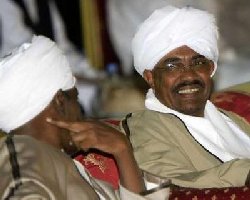Sudan's president has sought to calm widespread fears over a possible outbreak of violence, as tensions mount ahead the south's self-determination referendum set for January 9.
Omar al-Bashir vowed on Friday in Khartoum, the capital, to accept the vote's outcome whatever it may be and protect people on both sides if territorial conflicts erupt between northerners and southerners.
"For the southerners and also the people of the north we promise that we will guarantee and fulfill their safety and the safety of the whole people," al-Bashir said.
"And we are following that path to make the referendum to happen in a peaceful away to help them to fulfill their aspirations of an independent country for them."
Security preparations
Al Jazeera's Mohammed Adow, reporting from Khartoum, said the government is moving to ensure that the vote is held peacefully.
"The government is already planning to put in place so much security. The police will be assisted by paramilitary police ensuring security," Al-Jazeera correspondent said.
"The president has sent a passionate plea to the regional authorities in the south to ensure the referendum is held is a climate of freedom and democracy."
Many fear that the south, which is composed mainly of indigenous tribes and Christians, and the predominantly Muslim north, will be embroiled in another civil war over territory following the vote.
The two regions have already fought two wars - the first from 1955 to 1972 and the second from 1983 until a peace agreement in 2005.
More than 2.5 million people died and four million others were displaced in the conflicts.
Fears of conflict
The referendum allowing the people of the south to vote on whether to become an independent state is part of a 2005 peace deal which brought the second civil war to an end.
Analysts are predicting that the south is likely to secede, which would mean that Sudan's borders will need to be redrawn.
Many in the south hope that splitting from the north will give them the chance to build a new African nation, but others fear it will spark a bloody battle over the country's oil-rich land.
South Sudan will swallow much of the Nile river basin and the bulk of the current nation's oil reserves.
But even if the country is formally divided, some of its key industries will prove difficult to separate.
Sudan has oil concessions all over the country and exploration projects lead by some of the world's biggest multinationals are ongoing.
So far, the majority of exploitable oilfields have been in the south, but the refineries to turn the crude into a usable product are located in the north.
PHOTO CAPTION
Sudan's President Omar Hassan al-Bashir (R) talks to Vice President Ali Osman Taha during celebrations for the 55th anniversary of Sudan's independence at the Palace in Khartoum December 31, 2010.
Al-Jazeera


 Home
Home Discover Islam
Discover Islam Quran Recitations
Quran Recitations Lectures
Lectures
 Fatwa
Fatwa Articles
Articles Fiqh
Fiqh E-Books
E-Books Boys & Girls
Boys & Girls  Ramadan
Ramadan Fatwa Audios
Fatwa Audios Month of Mercy
Month of Mercy Women
Women Eed Al- Fitr
Eed Al- Fitr Food Recipes
Food Recipes Videos
Videos

 Prayer Times
Prayer Times












